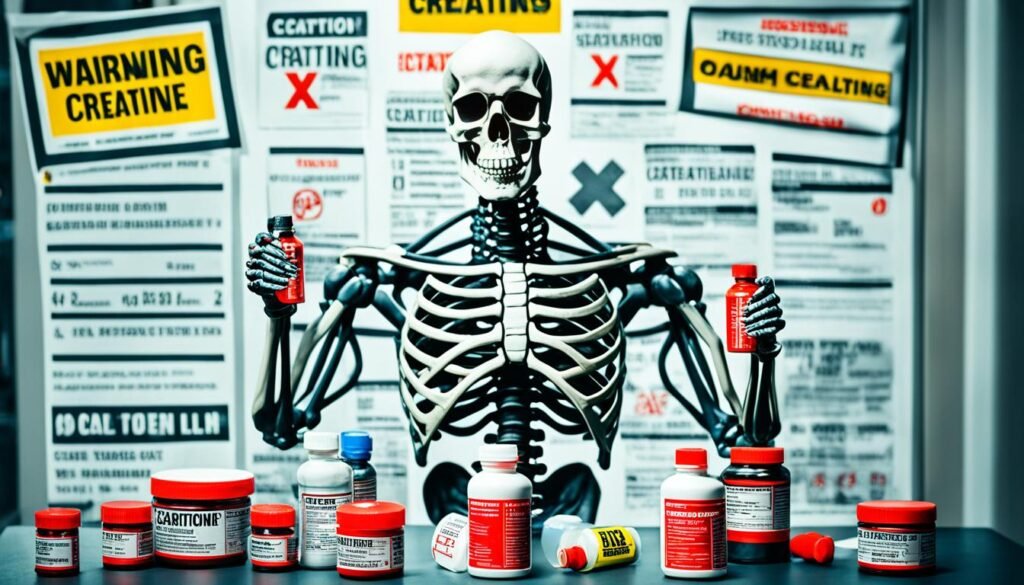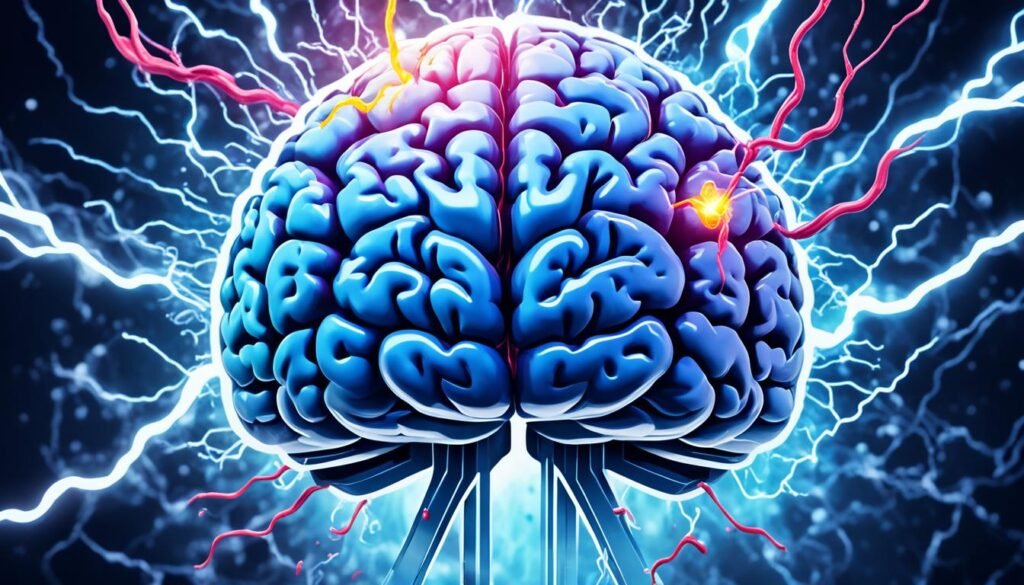Consider this: a naturally occurring substance within your body could be one of the most effective allies in boosting your athletic performance. Renowned for its performance enhancement capabilities, creatine supplementation is not just a staple in the regimen of bodybuilders and elite athletes; it is scientifically proven to amplify muscle strength and contribute to significant gains in fat-free mass. As someone who values pushing my physical limits, I find it astonishing that when partnered with heavy resistance training, creatine can augment high-intensity sprints and possess potential benefits for endurance training, although it presents diminishing returns over extended exercise durations.
But let’s delve deeper. Creatine isn’t just about building muscle; it plays a pivotal role in the way our cells produce energy. Every day, our bodies synthesize around 1 gram of creatine, predominantly in the liver, kidneys, and pancreas, matching what we typically consume in our diet. With oral creatine monohydrate standing as the most researched form of supplementation, its application stretches from the gym to clinical settings, signifying its importance beyond just athletic performance.
Key Takeaways
- Creatine supplementation has been consistently linked to enhanced athletic performance.
- It supports increased muscle strength and morphology, vital for high-intensity training.
- Regular supplementation with creatine helps to replenish energy stores swiftly, essential for short bursts of activity.
- The role of creatine extends to potential benefits in endurance, especially as it aids quicker recovery.
- Understanding the science behind how creatine affects the body can inform safer, more effective supplementation practices.
- Creatine carries clinical importance for certain pathologies, evidencing its broader health implications.
Understanding Creatine: A Natural Performance Enhancer
When we delve into the composition and capabilities of our bodies, the intricate role of creatine is both fascinating and pivotal. This naturally occurring substance is instrumental in enhancing muscle strength and honing our abilities during demanding anaerobic exercise.
What is Creatine and How is it Produced in the Body?
My quest to better understand creatine began at its origin—the body’s internal synthesis process. Comprised of three essential amino acids: glycine, arginine, and methionine, creatine formation is a marvel of biological engineering, facilitated by a trio of enzymes. Liver, kidneys, and pancreas play leading roles in production, creating a substance pivotal for peak performance.
The Role of Creatine in Muscle and Anaerobic Performance
Grasping the impressive creatine benefits in the context of muscle amplification and robust anaerobic exercise becomes clearer upon realizing its bodily distribution—95% nestled within our skeletal muscles, ready to sprint into action as we push the limits of endurance and power. I’ve learned that this compound is crucial for those seeking to optimize their energy reserves during high-intensity training spells, efficiently replenishing ATP and thereby granting sustained, Herculean performance across repeated exertions.
| Creatine Benefit | Effect on Muscle Strength | Impact on Anaerobic Exercise |
|---|---|---|
| ATP Regeneration | Enables more intensive and longer training | Provides rapid energy during short, high-intensity workouts |
| Muscle Saturation | Increases potential for muscle hypertrophy | Improves maximal power output |
| Energy Buffering | Delays onset of muscle fatigue | Enhances recovery during repeated bouts of exercise |
In my investigation, it’s evident that the creatine transporter CreaT1 serves as a cellular usher, escorting this precious resource efficiently into our eager muscles. A generous creatine pool, ranging from 120 to 140 grams in an average young male, underscores its vital presence, with variations hinging on muscle mass and fiber type nuances.
In conclusion, as I reflect on the bestowed creatine benefits, I can affirm its importance in the realm of fitness. Whether one’s focus is amassing muscle strength or excelling in the rigors of anaerobic exercise, creatine stands as a cornerstone of their regimen, an ally in the quest for peak performance.
Exploring the Impact of Creatine Supplementation on Athletic Performance

My investigation into the effects of creatine loading has uncovered that it significantly upscales the body’s capability for muscle growth and high-intensity training. Regarded as a powerhouse for athletes, creatine loading augments muscle creatine stores, pivotal for the rapid regeneration of ATP. This biochemical reality equips athletes to resist fatigue, sustain intense training bouts, and amplify their workout quality. A noticeable upswing in both maximum power output and muscle hypertrophy has been documented, showcasing an 8% to 14% leap in performance metrics. Truly, these findings embody the symbiotic relationship between creatine supplementation and resistance training.
Yet, it’s important to note the existence of sundry outcomes in research studies, stemming from variances in creatine supplementation protocols. Not all athletes respond identically to creatine supplementation; thus, a stratification in study results ensues. Furthermore, while creatine is the linchpin for neuromuscular prowess in short, zestful exercises, its contribution to endurance training improvement is less pronounced. Below is a table that summarizes the typical performance enhancements observed with creatine supplementation:
| Performance Indicator | Percentage Improvement | Notes |
|---|---|---|
| Maximum Strength | 8% – 14% | Most notable in exercises like powerlifting |
| Muscle Hypertrophy | Varies | Dependent on resistance training intensity and regimen |
| Neuromuscular Performance | Significant improvement | Evident in short, high-intensity exercises |
| Endurance Strength | Minimal to moderate | Enhancement may be less in endurance-focused training |
As a professional invested in the interplay between supplements and physical performance, my focus on creatine underscores its pivotal role in optimizing athletic training and muscle development. The comprehensive analysis of myriad studies unequivocally points to its efficacy within designated facets of athletic vigor.
The Science Behind Creatine and Performance
When we talk about achieving peak athletic performance, the conversation often turns to how we can optimize the body’s energy production and muscle strength. It’s here that creatine supplementation steps into the spotlight, recognized for its significant role in enhancing our physical capabilities.
Investigating Creatine’s Role in ATP Regeneration and Energy Supply
My exploration into the effects of creatine on energy supply begins with its intrinsic role in the regeneration of ATP, the energy currency of the cell. During periods of intense exercise, ATP is consumed at a rapid rate, and the presence of adequate creatine phosphate in the muscle tissue becomes pivotal for the resynthesis of ATP.
Analyzing the Effects of Creatine on Muscle Strength and Endurance
But the benefits of creatine don’t stop there. My analysis reveals that consistent creatine supplementation can lead to measurable gains in muscle strength and endurance. This is largely due to an increased creatine pool within the body, which allows athletes to push harder during workouts and recover more quickly between training sets. As a result, the potential for muscle hypertrophy and strength gains is significantly elevated.
| Supplement | Benefit | Impact on Performance |
|---|---|---|
| Creatine Monohydrate | Increased Creatine Pool | Improved Muscle Strength |
| Creatine Monohydrate | Faster ATP Regeneration | Enhanced Short Duration, High-Intensity Performance |
| Creatine Monohydrate | Facilitates Ca2+ Reuptake | More Rapid Force Production |
Importantly, while creatine’s impact on performance enhancement is primarily associated with bursts of short-term, high-intensity exercise, it also contributes to increased muscle mass and overall muscle strength, factors that serve to benefit athletes across a wide range of disciplines. Thus, from sprinters to weightlifters, creatine is a vital ally in the quest for superior athletic performance.
Methods of Creatine Supplementation: Dosage and Protocol

As a fitness enthusiast constantly on the lookout for performance enhancement strategies, I’ve explored various supplementation protocols. One such regimen is creatine loading, a method that maximizes the muscles’ storage of creatine. Through this effective loading technique, a higher initial dose of approximately 25 g/day is consumed for about one week. Post the saturation period, a maintenance dose of 5 g/day sustains the creatine levels.
Despite the prevalence of anecdotes about creatine supplementation side effects, my research and personal observations align with scientific evidence that dispels these concerns. The recommended creatine dosage of 3-5 g/day or 0.1 g/kg body mass/day is generally well-tolerated and lacks substantiated risks of renal damage or undue water retention. Rigorous studies indicate that these protocols are safe and proficient in yielding desired fitness results.
| Phase | Dosage | Duration | Expected Outcome |
|---|---|---|---|
| Loading | 25 g/day | 1 week | Rapid saturation of muscular creatine stores |
| Maintenance | 5 g/day | Post-loading phase | Sustained creatine levels for ongoing performance benefits |
In the world of sports nutrition, it’s imperative to approach supplementation with a critical eye. By following the established creatine loading protocol and transitioning to a maintenance dose post-loading, I’ve personally experienced and can vouch for the tangible benefits in performance enhancement without any discernible side effects that often cloud creatine’s reputation.
Creatine’s Mechanisms: Enhancing Performance at the Cellular Level
As we delve deeper into the biochemical impact of creatine on muscle performance, it’s clear that this compound does far more than merely serve as a quick energy reserve. Creatine supplementation has a profound effect on muscle cells, influencing everything from energy metabolism to muscle fiber growth. The intricate dance of molecules within our cells lays the foundation for significant performance enhancement, particularly when paired with disciplined resistance training.
The Biochemistry of Creatine in Cells and Muscle Fibers
Inside the muscle cell, creatine becomes a pivotal player in energy turnover. By increasing the phosphocreatine stores, my cells have an immediate energy buffer during high-intensity activities. This cellular mechanism allows for a swift regeneration of ATP, the vital energy currency of muscle contractions. Understanding the depth of creatine’s role in ATP homeostasis clarifies why creatine supplementation is critical for athletes seeking performance enhancement at the most foundational level.
Creatine and Muscle Morphology: Growth and Adaptation
The journey of muscle growth is one of continuous adaptation and remodeling. With creatine supplementation, my muscles undergo favorable changes that bolster both size and function. This supplement aids the proliferation of satellite cells, aiding the repair and growth of muscle fibers. As a result, my training becomes not only about challenging my current limitations but also about creating a fertile ground for muscle hypertrophy — the ultimate goal for anyone dedicated to improving their physique and muscle growth.
| Muscle Function | Without Creatine | With Creatine |
|---|---|---|
| ATP Regeneration | Slower, Fatigue-prone | Rapid, Sustained Performance |
| Satellite Cell Activity | Baseline Proliferation | Enhanced Muscle Repair |
| Muscle Hypertrophy | Limited by Myostatin | Promoted through Inhibitor Reduction |
| Performance Gains | Inconsistent | Amped Across Strength Workouts |
By integrating creatine supplementation into my routine, I’m not just pushing past my previous performance peaks; I’m actively transforming the cellular landscape of my muscles to support growth and energy efficiency. The intersection of hard training and smart supplementation is where true performance enhancement thrives.
Addressing Common Myths and Misunderstandings About Creatine

In my experience as a journalist covering health and fitness topics, I’ve encountered numerous myths surrounding creatine supplementation. It’s essential to separate fact from fiction to appreciate the full scope of creatine benefits and understand any potential creatine supplementation side effects. In this section, we’ll tackle some prevalent misconceptions and provide clarity based on scientific evidence.
Debunking Creatine Related Myths on Water Retention and Kidney Damage
One prevalent myth suggests that creatine supplementation leads to harmful water retention and kidney damage. While it’s true that creatine can cause water molecules to move into the muscle cells, which may result in a slight increase in weight during the initial loading phase, this effect is temporary and not detrimental to health. Moreover, studies show that long-term creatine use does not significantly affect total body water content.
Concerns about kidney damage are also largely unfounded. Numerous studies indicate that when consumed at recommended doses, creatine does not impair kidney function. Ensuring adequate hydration and consulting with a healthcare provider before starting supplementation can further mitigate concerns.
Research supports that creatine is well-tolerated and does not foster renal dysfunction when consumed at recommended doses.
Clarifying the Differences Between Creatine and Anabolic Steroids
Another common misunderstanding is equating creatine with anabolic steroids. These substances have different mechanisms of action within the body. Creatine works by replenishing ATP, the primary energy currency in our cells, which can contribute to increased power and endurance in athletic performance. On the contrary, anabolic steroids interact with androgen receptors to increase muscle protein synthesis.
It’s crucial to understand that creatine is a naturally occurring compound that can also be found in various foods, while anabolic steroids are synthetic and have a host of legal and health-related concerns when used for performance enhancement.
| Creatine | Anabolic Steroids |
|---|---|
| Naturally occurring substance | Synthetic compounds |
| Increases ATP regeneration | Promotes muscle protein synthesis |
| No significant impact on hormone levels | Modifies natural hormone levels |
| Generally safe when used as recommended | Potential for serious health risks |
Understanding these differences is paramount for athletes and fitness enthusiasts looking to make informed decisions about their supplementation choices. While creatine offers a legal and safe way to potentially enhance performance, the use of anabolic steroids can lead to serious legal and health consequences.
Diverse Benefits of Creatine Beyond Muscle Strength

While it’s well-known that creatine enhances muscle strength, recent research reveals its impact extends into cognitive domains and diverse athletic disciplines. I’ve delved into the scientific discourse surrounding these additional benefits and have uncovered intriguing evidence pointing to creatine’s multifaceted role.
Nutritional Effects: How Creatine Supports Cognitive Function
Cognitive performance is paramount in both daily life and competitive environments. Significantly, studies suggest that creatine supplementation might confer cognitive benefits, particularly under conditions of mental fatigue or sleep deprivation. The mechanism presumed involves creatine’s energy-modulating capacity within the brain, potentially enhancing concentration and reaction times.
The Versatility of Creatine: Uses in Various Sports and Activities
The prowess of creatine isn’t limited to the weight room or short-burst activities. Endurance training, a realm often overlooked when considering creatine use, can benefit from the supplement’s ability to reduce lactic acid accumulation and enhance time to exhaustion. This has been shown in activities like rowing, where endurance athletes achieve considerable performance improvements.
| Sport | Benefit of Creatine |
|---|---|
| Weightlifting | Increases muscle strength and power output |
| Sprinting | Improves short-duration, high-intensity performance |
| Rowing | Reduces lactic acid production, enhances endurance |
| Cognitive Sports (e.g., Chess) | Supports mental acuity under stress and fatigue |
My exploration underscores creatine’s versatility across an array of athletic and mental pursuits, suggesting that incorporating it into one’s nutrition regime could be beneficial irrespective of the sport or activity. It’s a supplement that not only bolsters muscle strength but also supports cognitive performance and endurance, underscoring its adaptability and broad-reaching impact.
Creatine Safety Profile and Side Effects: An Evidence-Based Review

As a supplement that has received a significant amount of research attention, creatine is commonly integrated into fitness regimens to enhance muscle growth and athletic performance. However, understanding the intricacies of creatine supplementation side effects is imperative for safe and effective use.
Long-Term Safety of Creatine Supplementation in Different Populations
I’ve thoroughly reviewed the scientific literature regarding the safety of creatine. Findings consistently reveal that all age groups, from the youth to the elderly, and diverse populations including athletes and sedentary individuals, general bear creatine supplementation well. There are, however, certain rare instances where creatine can interact differently within the body, which underscores the necessity of adhering to recommended dosages.
Identifying and Managing Potential Side Effects of Creatine
Although adverse reactions to creatine are uncommon, I strongly advise individuals to remain vigilant to their body’s reactions during supplementation. Below, I present a table that summarizes potential side effects and management strategies:
| Side Effect | Symptoms | Management |
|---|---|---|
| Gastrointestinal Discomfort | Bloating, stomach cramps, nausea | Decrease dosage, split doses over the day, or take with meals |
| Water Retention | Temporary weight gain, swelling | Maintain hydration, monitor changes in body composition |
| Muscle Cramping | Tightness or spasms in muscles | Ensure adequate hydration and electrolyte intake |
| Renal Stress | Unusual changes in urine output or color | Stay within recommended doses; consult with a healthcare provider if pre-existing renal conditions |
By following these strategies, the risks associated with creatine supplementation can be minimized. Always listen to your body and consult with a healthcare professional if concerns arise. With the right approach, creatine can be a safe addition to your fitness journey.
Conclusion
Through the detailed investigation into The Science Behind Creatine and Performance, it’s clear that creatine is far more than just a supplement; it’s a scientifically backed aid with multiple benefits for those engaging in various forms of exercise. Addressing both muscle strength and cognitive performance, creatine benefits a wide array of individuals committed to improving their physical and mental fitness.
While it’s imperative to navigate the world of supplementation with an informed perspective, the prevailing scientific consensus reaffirms the safety and efficacy of creatine. Used responsibly, it serves as a substantial ally in the quest for performance optimization. My in-depth exploration underscores that despite the longevity of certain misconceptions, evidence-based research continues to dispel doubts surrounding creatine use.
In essence, as a journalist dedicated to unpacking the complexities of supplements, I recognize creatine’s significant role in advancing athletic capacity and cognitive function. As ongoing research furthers our comprehension, it becomes increasingly apparent that creatine stands as an invaluable resource for athletes and anyone aspiring to elevate their performance.
FAQ
What is Creatine and How is it Produced in the Body?
Creatine is a naturally occurring substance synthesized in the body predominantly by the liver, kidneys, and pancreas. It is also obtained through dietary sources, especially meats. Derived from the amino acids glycine, arginine, and methionine, creatine is mainly stored in skeletal muscles and plays a critical role in energy production, particularly for short bursts of intense exercise.
The Role of Creatine in Muscle and Anaerobic Performance?
Creatine is vital for the quick regeneration of adenosine triphosphate (ATP), the energy currency of the cell, during high-intensity, short-duration exercises. By increasing the availability of ATP, creatine enhances strength, power output, and overall anaerobic performance. This leads to improvements in activities such as sprinting and weightlifting, which require immediate energy.
How Does Creatine Supplementation Affect Athletic Performance?
Creatine supplementation is associated with increased muscle creatine stores, which support more efficient ATP regeneration between exercise sets. This enables athletes to sustain higher workout intensities, which can improve strength, power, and muscle hypertrophy. Creatine also improves neuromuscular function, particularly in anaerobic activities.
Investigating Creatine’s Role in ATP Regeneration and Energy Supply?
Creatine plays a pivotal role in regenerating ATP during high-intensity, short-duration exercises by donating a phosphate group to adenosine diphosphate (ADP), thus replenishing ATP levels. This rapid ATP regeneration is essential for continuous muscular contraction and peak athletic performance.
Analyzing the Effects of Creatine on Muscle Strength and Endurance?
Creatine supplementation in conjunction with resistance training has been shown to significantly improve muscle strength and endurance. Studies have shown an average 8% to 14% improvement in performance outcomes such as maximum lifting weight and prolonged muscular endurance.
What is the Recommended Dosage and Protocol for Creatine Supplementation?
The typical creatine supplementation protocol suggests a loading phase of 25 grams per day, divided into multiple doses, for about one week, followed by a maintenance dose of around 5 grams per day. This regime is widely recognized to enhance the creatine pool in muscles effectively and is generally considered safe.
The Biochemistry of Creatine in Cells and Muscle Fibers?
Creatine’s biochemical function within muscle cells involves serving as a rapidly mobilizable source of phosphate for ATP regeneration. Creatine kinase catalyzes the transfer of a phosphate group from creatine phosphate to ADP, resulting in the production of ATP. This process is critical during quick, explosive movements or exercises.
Creatine and Muscle Morphology: Growth and Adaptation?
Creatine has been linked to a variety of cellular and sub-cellular adaptations that promote muscle growth, such as increased satellite cell proliferation, and changes in myogenic transcription factors and growth factor signaling. These effects lead to a decrease in muscle growth inhibitors (like myostatin), which fosters a more conducive environment for muscle hypertrophy.
Debunking Creatine Related Myths on Water Retention and Kidney Damage?
Despite misconceptions, creatine does not cause harmful water retention or kidney damage when taken at recommended doses. Initial increases in total body water are due to creatine’s osmotic properties, but long-term usage does not alter total body water content significantly. Moreover, evidence-based research has shown that creatine is safe for kidney function in healthy individuals.
Clarifying the Differences Between Creatine and Anabolic Steroids?
Creatine and anabolic steroids differ fundamentally in their action. Creatine assists in the rapid regeneration of ATP, aiding better performance in high-intensity exercises. Anabolic steroids, conversely, increase muscle mass and strength by mimicking testosterone, promoting greater protein synthesis within muscles.
How Does Creatine Support Cognitive Function?
Emerging evidence suggests that creatine supplementation may enhance cognitive function, particularly in tasks that require speed of processing and working memory. This cognitive benefit is likely due to the role of creatine in maintaining ATP levels in the brain, similar to its energy-providing role in muscle tissue.
The Versatility of Creatine: Uses in Various Sports and Activities?
Creatine is versatile and beneficial across various sports and physical activities. It has been shown to improve performance in high-intensity sports like weightlifting, football, and sprints, as well as in endurance activities such as rowing, where improved energy efficiency and decreased lactic acid buildup are advantageous.
Long-Term Safety of Creatine Supplementation in Different Populations?
Studies have affirmed the long-term safety of creatine supplementation in a variety of populations, including young and elderly athletes, and sedentary individuals. While considered safe, it’s important to consider potential individual responses and follow recommended doses.
Identifying and Managing Potential Side Effects of Creatine?
While creatine is generally safe, potential side effects, although rare, may include gastrointestinal discomfort, muscle cramping, and dehydration. These can typically be managed by ensuring proper hydration and adherence to recommended dosing protocols for creatine supplementation.




